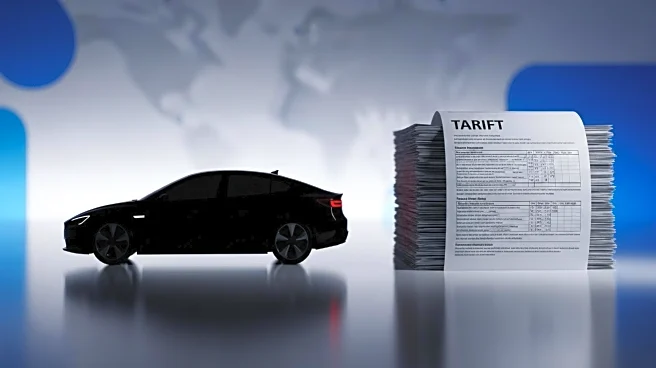What's Happening?
Electric vehicle manufacturers Tesla and BYD are anticipated to be significantly affected by Mexico's recent proposal to increase tariffs on automobiles and other imports from China and various Asian countries to 50%. This proposal marks a substantial rise from the current tariff rates, which range from 15% to 20%. The proposed tariffs have not yet been approved by Mexico's Congress, but they have already prompted a warning from China's Ministry of Commerce about possible retaliatory measures. The elevated tariffs are expected to impact Tesla and BYD the most, while legacy automakers like General Motors, Ford, and Stellantis may be spared due to a 2003 decree allowing them to import a percentage of vehicles without tariffs from countries without a free trade agreement with Mexico.
Why It's Important?
The proposed tariff increase could have significant implications for Tesla and BYD's operations and sales in Mexico. BYD, which has seen rapid sales growth in Mexico since entering the market in late 2023, may face a notable impact on demand due to the potential steep increase in tariffs. Tesla, which has been selling its Model 3 and Model Y cars produced in Shanghai in Mexico, might need to adjust its supply chain to mitigate the impact of the tariffs. The news adds to existing concerns among BYD investors about the company's profitability, as it has been offering steep price cuts to remain competitive. Tesla is also under pressure due to weak deliveries and intense competition in key markets.
What's Next?
If the tariffs are approved, Tesla and BYD may need to explore alternative production and import strategies to maintain their market presence in Mexico. Tesla could leverage its inventory of EVs already in Mexico to buy time for shifting imports from China to other production facilities. Both companies may also need to reassess their pricing strategies to offset the increased costs associated with higher tariffs. The situation could lead to broader discussions on trade policies and their impact on international business operations.
Beyond the Headlines
The proposed tariffs highlight the complexities of international trade relations and the potential for economic retaliation. The situation underscores the importance of strategic planning for companies operating in multiple countries, particularly in the face of changing trade policies. It also raises questions about the long-term sustainability of competitive pricing strategies in the EV market, as companies like BYD leverage subsidies and low costs to undercut rivals.








